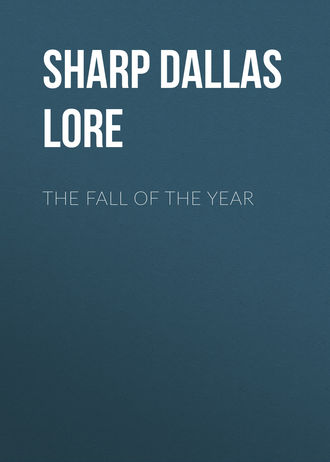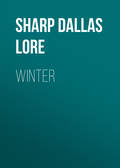
Sharp Dallas Lore
The Fall of the Year
CHAPTER VI
THANKSGIVING AT GRANDFATHER’S FARM
THANKSGIVING at Grandfather’s farm was more than a holiday. It was a great date on the calendar, for it divided the year in halves as no other single day of the three hundred and sixty-five did. It marked the end of the outdoors, and the beginning of the indoors – the day when everybody came home; when along with them into the house came all the outdoors, too, as if the whole farm were brought in to toast its toes before the great hearth fire!
For the hearth fire was big enough and cheery enough. And so was the farmhouse – that is, if you added the big barn and the crib-house and the wagon-house and the dog-house and the hen-house and the “spring-house!”
Oh, there was plenty of room inside for everybody and for everything! And there needed to be; for did not everybody come home to Grandfather’s for Thanksgiving? And did not everything that anybody could need for the winter, grow on Grandfather’s farm?
And it all had to be brought in by Thanksgiving Day – everything brought in, everything housed and stored and battened down tight. The preparations began along in late October, continuing with more speed as the days shortened and darkened and hurried us into November. And they continued with still more speed as the gray lowering clouds thickened in the sky, and the wind began to whistle through the oak grove. Then, with the first real cold snap, the first swift flurry of snow, how the husking and the stacking and the chopping went on!
Thanksgiving must find us ready for winter indoors and out.
The hay-mows were full to the beams where the swallows built; the north and west sides of the barnyard were flanked with a deep wind-break of corn-fodder that ran on down the old worm-fence each side of the lane in yellow zigzag walls; the big wooden pump under the turn-o’-lane tree by the barn was bundled up and buttoned to the tip of its dripping nose; the bees by the currant bushes were doubled-hived, the strawberries covered with hay, the wood all split and piled, the cellar windows packed, and the storm-doors put on.
The very cows had put on an extra coat, and turned their collars up about their ears; the turkeys had changed their roost from the ridge-pole of the corn-crib to the pearmain tree on the sunny side of the wagon-house; the squirrels had finished their bulky nests in the oaks; the muskrats of the lower pasture had completed their lodges; the whole farm – house, barn, fields, and wood-lot – had shuffled into its greatcoat and muffler and settled comfortably down for the winter.
The old farmhouse was an invitation to winter. It looked its joy at the prospect of the coming cold. Low, weather-worn, mossy-shingled, secluded in its wayward garden of box and bleeding-hearts, sheltered by its tall pines, grape-vined, hop-vined, clung to by creeper and honeysuckle, it stood where the roads divided, halfway between everywhere, unpainted, unpretentious, as much a part of the landscape as the muskrat-lodge, and, like the lodge, roomy, warm, and hospitable.
Round at the back, under the wide, open shed, a door led into the kitchen; another led into the living-room; another, into the store-room; and two big, slanting double-doors, scoured and slippery with four generations of sliders, covered the cavernous way into the cellar. But they let the smell of apples up, as the garret door let the smell of sage and thyme come down; while from the door of the store-room, mingling with the odor of apples and herbs, filling the whole house and all my early memories, came the smell of broom-corn, came the sound of Grandfather’s loom.
For Grandfather in the winter made brooms – the best brooms, I think, that ever were made. The tall broom-corn was grown on the farm in the summer, ripened and cut and seeded, and then, as soon as winter set in, was loomed and wired and sewed into brooms.
But the cured and seeded broom-corn was not the main thing, after all, that was brought in for the winter. Behind the stove in the kitchen, stood the sweet-potato box (a sweet potato, you know, must be kept dry and warm). An ample, ten-barrel box it was, fresh-papered like the walls, full of Jersey sweets that were sweet – long, golden, syrupy potatoes, such as grow only in the warm sandy soil of southern New Jersey.
Against that big box in Grandmother’s kitchen stood the sea-chest, fresh with the same kitchen paper and piled with wood. There was another such chest in the living-room near the old fireplace, and still another in Grandfather’s work-room behind the “template” stove.
But wood and warmth and sweet smells were not all. There was music also, the music of life, of young life and of old life – grandparents, grandchildren (about twenty-eight of the latter). There were seven of us alone – a girl at each end of the seven and one in the middle. Thanksgiving always found us all at Grandfather’s and brimming full of thanks.
That, of course, was long, long ago. Things are different nowadays. There are as many grandfathers, I suppose, as ever; but they don’t make brooms in the winter and live on farms.
They live in flats. The old farm with its open acres has become a city street; the generous old farmhouse has become a speaking-tube, kitchenette, and bath – all the “modern conveniences”; the cows have evaporated into convenient cans of condensed “milk”; the ten-barrel box of potatoes has changed into a convenient ten-pound bag, the wood-pile into a convenient five-cent bundle of blocks tied up with a tarred string, the fireplace into a convenient gas log, the seven children into one or none, or into a little bull-terrier pup.
But is it so? No, it is not so – not so of a million homes. For there is many an old-fashioned farmhouse still in the country, and many a new-fashioned city house where there are more human children than little bull-terrier pups.
And it is not so in my home, which is neither a real farm nor yet a city home. For here are some small boys who live very much as I did when I was a boy. No, they are not farmer’s boys; for I am not a farmer, but only a “commuter” – if you know what that is. I go into a great city for my work; and when the day’s work is done, I turn homeward here to Mullein Hill – far out in the country. And when the dark November nights come, I hang the lantern high in the stable, as my father used to do, while four shining faces gather round, as four small boys seat themselves on upturned buckets behind the cow. The lantern flickers, the milk foams, the stories flow – “Bucksy” stories of the noble red-man; and stories of the heroes of old; and marvelous stories of that greatest hero of all – their father, far away yonder when he was a boy, when there were so many interesting things to do on Grandfather’s farm just before Thanksgiving Day.
CHAPTER VII
A CHAPTER OF THINGS TO DO THIS FALL
I
YOU ought to go out into the fields and woods as many as six times this fall, even though you have to take a long street-car ride to get out of the city. Let me give you just six bits of sound advice about going afield: —
First, go often to the same place, so that you can travel over and over the same ground and become very familiar with it. The first trip you will not see much but woods and fields. But after that, each succeeding walk will show you particular things – this dead tree with the flicker’s hole, that old rail-pile with its rabbit-hole – until, by and by, you will know every turn and dip, every pile of stones, every hole and nest; and you will find a thousand things that on the first trip you didn’t dream were there.
Secondly, when you go into the woods, go expecting to see something in particular – always looking for some particular nest, bird, beast, or plant. You may not find that particular thing, but your eyes will be sharpened by your expectation and purpose, and you will be pretty sure therefore to see something. At worst you will come back with a disappointment, and that is better than coming back without a thing!
Thirdly, go off when you can alone. Don’t be selfish, unsociable, offish – by no means that. But you must learn to use your own eyes and ears, think your own thoughts, make your own discoveries, and follow the hints and hopes that you alone can have. Go with the school class for a picnic, but for woodcraft go alone.
Fourthly, learn first of all in the woods to be as silent as an Indian and as patient as a granite rock. Practice standing still when the mosquitoes sing, and fixing your mind on the hole under the stump instead of the hole the mosquito is boring between your eyes.
Fifthly, go out in every variety of weather, and at night, as well as during the day. There are three scenes to every day – morning, noon, and early evening – when the very actors themselves are changed. To one who has never been in the fields at daybreak, the world is so new, so fresh and strange, as to seem like a different planet. And then the evening – the hour of dusk and the deeper, darker night! Go once this autumn into the woods at night.
And lastly, don’t go into the woods as if they were a kind of Noah’s Ark; for you cannot enter the door and find all the animals standing in a row. You will go a great many times before seeing them all. Don’t be disappointed if they are not so plentiful there as they are in your books. Nature books are like menageries – the animals are caught and caged for you. The woods are better than books and just as full of things, as soon as you learn to take a hint, to read the signs, to put two and two together and get – four – four paws – black paws, with a long black snout, a big ringed and bushy tail – a coon!
II
Whether you live in the heart of a great city or in the open country, you ought to begin this fall to learn the names and habits of the birds and beasts (snakes, lizards, turtles, toads!) that live wild in your region. Even when all the summer birds have gone south for the winter, there will remain in your woods and fields crows, jays, juncos, tree sparrows, chickadees, kinglets, nuthatches, screech owls, barred owls, – perhaps even snowy owls, – quails, partridges, goldfinches, with now and then a flock of crossbills, snow buntings, and other northern visitors, and even a flicker, robin, and bluebird left over from the fall migrations. These are plenty to begin on; and yet, as they are so few, compared with the numbers of the summer, the beginner’s work is thus all the easier in the autumn.
III
You should go out one of these frosty mornings for chestnuts, if they grow in your woods; or for “shagbarks,” if you live in New England; for black walnuts, if you live in the Middle States; for pecan nuts, if you live in the Gulf States; for butternuts, if you live in the states of the Middle West; for – what kind of nuts can you not go for, if you live in California where they make everything grow! It matters little whether you go for paper-shelled English walnuts or for plate-armored pignuts so long as you go. It is the going that is worth while.
IV
You ought to go “cocooning” this fall – to sharpen your eyes. But do not go often; for once you begin to look for cocoons, you are in danger of seeing nothing else – except brown leaves. And how many brown leaves, that look like cocoons, there are! They tease you to vexation. But a day now and then “cocooning” will do you no harm; indeed, it will cultivate your habit of concentration and close seeing as will no other kind of hunting I know.
Bring home with you the big brown silky cocoons of cecropia – the largest cocoon you will find, lashed all along its length to its twig, and usually near the ground. Look on the black cherry, the barberry, sassafras, and roadside and garden trees for the harder, whiter cocoon of the promethea moth. This hangs by its tip, because the caterpillar has begun his house by using the leaf, spinning it into the cocoon as part of its walls, much as does the wretched “brown-tail.” The gray cocoons, or rather nests, of this “brown-tail” moth you must bring home to burn, for they are one of our greatest pests. You will find them full of tiny caterpillars as you tear them open.
Bring home your collection and, with the help of such a book as “Moths and Butterflies” by Mary C. Dickerson, identify them and hang them up for their “coming out” in the spring.
V
If you live in the city, you ought to go up frequently to your roof and watch for the birds that fly over. If in one of our many cities near the water, you will have a chance that those in the country seldom have, of seeing the seabirds – the white herring gulls (the young gulls are brown, and look like a different species), as they pass over whistling plaintively, and others of the wild seafowl, that merely to hear and see in the smoky air of the city, is almost as refreshing as an ocean voyage. Then there are the parks and public gardens – never without their birds and, at the fall migrating time, often sheltering the very rarest of visitors.
VI
In order to give point and purpose to one of these autumn outings, you should take your basket, or botanizing can, and scour the woods and fields for autumn berries. No bunch of flowers in June could be lovelier than the bunch of autumn berries that you can gather from thicket and wayside to carry home. And then, in order to enjoy the trip all over again, read James Buckham’s exquisite story, “A Quest for Fall Berries,” in his book, “Where Town and Country Meet.”
VII
Take your botany can on a trip toward the end of November and see how many blossoming flowers you can bring home from the woods. Wild flowers after Thanksgiving in any northern state? Make the search, on all the southern slopes and in all the sheltered corners and see for yourselves. When you get back, you will want to read Mr. Bradford Torrey’s account of the flowers that he found blossoming out of doors in New England in the month of November. But who is Mr. Bradford Torrey? and where can you find this account of his November walk? You do not know? Well, then there is something more for you to do this fall.
VIII
While you are finding out who Mr. Torrey is and what he has written, you should also get acquainted with John Burroughs, Olive Thorne Miller, Thoreau, Frank Bolles, William Hamilton Gibson, C. C. Abbott, Edward Breck, Gilbert White, and – but these will do for this fall. Don’t fail to read dear old Gilbert White’s “Natural History of Selborne”; though perhaps we grown-ups like it better than you may this fall. If you don’t understand Gilbert White, then read this year “The Life of a Scotch Naturalist” by Samuel Smiles, and Arabella Buckley’s two books, “Life and Her Children,” and “Winners in Life’s Race.”
IX
You ought to tie up a piece of suet for the birds; keep your cat in the house, except during the middle of the day, and – but I shall tell you no more. There is no end to the interesting things to do in your study of the out of doors and in your tramps afield this autumn.
CHAPTER VIII
THE MUSKRATS ARE BUILDING
WE have had a week of almost unbroken rain, and the water is standing over the swampy meadow. It is a dreary stretch, – this wet, sedgy land in the cold twilight, – drearier than any part of the woods or the upland pastures. They are empty; but the meadow is flat and wet, it is naked and all unsheltered. And a November night is falling.
The darkness deepens. A raw wind is rising. At nine o’clock the moon swings round and full to the crest of the ridge, and pours softly over. I button my heavy ulster close, and in my rubber boots go down to the stream and follow it out to the middle of the meadow, where it meets the main ditch. There is a sharp turn here toward the swamp; and here at the bend, behind a clump of black alders, I sit quietly down and wait.
I have come out to the bend to watch the muskrats building; for that small mound up the ditch is not an old haycock, but a half-finished muskrat house.
As I wait, the moon climbs higher over the woods. The water on the meadow shivers in the light. The wind bites through my heavy coat and drives me back, but not before I have seen one, two, three little creatures scaling the walls of the house with loads of mud-and-reed mortar. I am driven back by the cold, but not before I know that here in the desolate meadow is being rounded off a lodge, thick-walled and warm, and proof against the longest, bitterest of winters.
This is near the end of November. My fire-wood is in the cellar; I am about ready to put on the double-windows and the storm-doors. The muskrats are even now putting on theirs, for their house is all but finished. Winter is at hand: but we are prepared, the muskrats and I.
Throughout the summer the muskrats had no house, only their tunnels into the sides of the ditch, their roadways out into the grass, and their beds under the tussocks or among the roots of the old stumps. All those months the water was low in the ditch, and the beds among the tussocks were safe and dry enough.
Now the November rains have filled river and ditch, flooded the tunnels, and crept up into the beds under the tussocks. Even a muskrat will creep out of his bed when cold, wet water creeps in. What shall he do for shelter? He knows. And long before the rains begin, he picks out the place for a house. He does not want to leave his meadow, therefore the only thing to do is to build, – move from under the tussock out upon the top of the tussock; and here, in its deep, wiry grass, make a new bed high and dry above the rising water; and close this new bed in with walls that circle and dome, and defy the very winter.
Such a house will require a great deal of work to build. Why should not two or three muskrats combine – make the house big enough to hold them all, save labor and warmth, too, and, withal, live sociably together? So they left, each one his single bed, and, joining efforts, started, about the middle of October, to build this winter house.
Slowly, night after night, the domed walls have been rising, although for several nights at a time I could see no apparent progress with the work. The builders were in no hurry. The cold was far off. But it is coming, and to-night it feels near and keen. And to-night there is no loafing about the lodge.
When this house is done, when the last hod of mud plaster has been laid on, – then the rains may descend and the floods come, but it will not fall. It is built upon a tussock; and a tussock – did you ever try to pull up a tussock?
Winter may descend, and boys and foxes may come – and they will come, but not before the walls are frozen. Then, let them come. The house will stand. It is boy-proof, almost; it is entirely rain-, cold-, and fox-proof. I have often seen where the fox has gone round and round the house in the snow, and where, at places, he has attempted to dig into the frozen mortar. But it was a foot thick, as hard as flint, and utterly impossible for his pick and shovel.
I said the floods, as well as the fox, may come. So they may, ordinarily; but along in March, when one comes as a freshet and rises to the dome of the house, then it fills the bed-chamber to the ceiling and drowns the dwellers out. I remember a freshet once in the end of February that flooded Lupton’s Pond and drove the muskrats of the whole pond village to their ridgepoles, to the bushes, and to whatever wreckage the waters brought along.
“The best-laid schemes o’ mice and men
Gang aft agley”
– and of muskrats, too.
But not very often do the muskrats’ plans go thus agley. For muskrats and wood mice and birds and bees, and even the very trees of the forest, have a kind of natural foresight. They all look ahead, at the approach of autumn, and begin to provide against the coming cold. Yet, weather-wise as a muskrat may be, still he cannot know all that may happen; he cannot be ready for everything. And so, if now and then, he should prove foresight to be vain, he only shows that his plans and our plans, his life and our lives, are very much alike.
Usually, however, the muskrat’s plans work out as he would have them. His foresight proves to be equal to all that the winter can bring. On the coldest winter days I shall look out over the bleak white waste to where his house shows, a tiny mound in the snow, and think of him safe and warm inside, as safe and warm as I am, in my house, here on the hilltop.
Indeed, I think the muskrat will be the warmer; for my big house here on Mullein Hill is sometimes cold. And the wind! If only I could drive the winter wind away from the corners of the house! But the house down in the meadow has no corners. It has walls, mud walls, so thick and round that the shrieking wind sweeps past unheard by the dwellers within; and all unheeded the cold creeps over and over the low thatch, to crawl back and stiffen upon the meadow.
The doors of this meadow house swing wide open throughout the winter; for they are in the bottom of the house, beneath the water, where only the muskrat can enter. Just outside the doors, down under the water and the roof of ice that covers all the flooded meadow, are fresh calamus roots, and iris and arum – food in abundance, no matter how long the winter lasts.
No, the winter has not yet come; but it is coming, for the muskrats are building. Let it come. Let the cold crawl stiff and gray across the meadow. Let the whirling snow curl like smoke about the pointed top of the little tepee down by the meadow ditch. Let the north wind do its worst. For what care the dwellers in that thick-walled lodge beneath the snow? Down under the water their doors are open; their roadways up the ditches as free as in the summer; and the stems of the sedges just as juicy and pink and tender.
The muskrats are building. The buds are leaving. Winter is coming. I must get out my own storm-windows and double-doors; for even now a fire is blazing cheerily on my wide, warm hearth.







